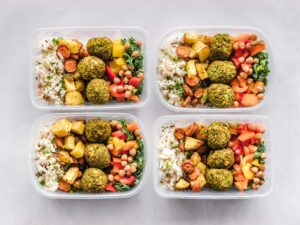NO TIME TO GROCERY SHOP? NO PROBLEM. USE WHAT YOU’VE GOT!
Pantry meals made easy
Need to go grocery shopping tomorrow but make dinner tonight? Believe it or not, you can still make nutrient-dense and affordable meals using ingredients that are already in your pantry!
Making family-friendly meals all week can be tiring and requires a lot of food. The reality of fitting in a grocery shop is not always possible the day you need something. That’s why it’s so important to know some key pantry staples that are healthy and last longer than fresh ingredients and keep them stocked in your pantry at all times. Whether you’re on a tight schedule or running out of space in the fridge or freezer, below are some simple and cost-effective ways to still make balanced meals using only the shelf-stable ingredients stocked in your cabinets.
Balanced meals should incorporate the three macro-nutrients: proteins, carbohydrates, and fats. When possible, I also like to include veggies for vitamins, minerals, and fiber. These are the foods that make up the bulk of our diet and provide us with energy to go about our daily activities. In this blog post, I’ll help you understand which common pantry staples fall under each category, and offer some pairings to make sufficient and delicious meals!
PROTEINS
Proteins are incredibly important when it comes to making balanced meals. Put simply, the building blocks of proteins are called amino acids. While some amino acids can be made in the body, others need to be obtained from food. These are called essential amino acids. Complete proteins contain all nine essential amino acids and therefore help our bodies function and grow. – these are the ones we really need 😉 They are responsible for building new cells, repairing damage, and supporting strong bones.
So which complete proteins are shelf-stable? Canned fish, such as tuna, salmon, and sardines are all great sources of protein, calcium, iron, magnesium, and B vitamins. Calcium supports strong and healthy bones, and B vitamins support energy levels. Magnesium helps muscle function and boosts the immune system. Lastly, iron maintains healthy blood.
For a plant-based alternative, shelf-stable options exist when purchasing tofu that can be refrigerated once opened. Quinoa is another complete protein that is great for all diets, including vegetarian and vegan diets. Canned or dried legumes are also a great healthy source of fiber to keep us full.
CARBOHYDRATES
Carbohydrates is actually not a dirty word – it just has a bad rep (unfortunately!). In fact, we all need carbohydrates as part of a balanced diet to fuel our bodies. In fact, carbohydrates are the primary energy source for our brains and are required for us to perform physical activity. Simple carbohydrates, such as table sugar, milk, and fruit are quickly broken down by the body and used for energy. These types of carbohydrates do not keep us full for very long. On the other hand, complex carbohydrates take longer to break down and provide lasting energy which keeps us fuller for longer. As previously mentioned, quinoa and legumes are excellent sources of proteins, but also complex carbohydrates. Other carbohydrate-rich pantry staples include brown rice, whole wheat pasta, oats, and starchy vegetables like potatoes. These foods contain fiber to keep us full and other nutrients such as riboflavin, thiamin, and niacin. These are B vitamins that help our metabolism function properly and efficiently.
FATS
Different from carbohydrates, fats are the body’s preferred energy source at rest. Fats contain the most calories per gram out of all the macronutrients, but provide us with very important nutrients. Healthy fats can protect our organs, maintain body temperature, and support healthy cholesterol levels. Avocados and extra virgin olive oil are two great sources of fat. When paired with a shelf-stable vinegar, these nutrient-dense oils make the perfect sauce or dressing for a balanced meal. Try balsamic, red wine, or apple cider vinegar for a punch of flavor.
WHAT ABOUT VEGETABLES?
Believe it or not, many canned or frozen vegetables are just as nutritious as fresh produce. Rich in vitamin A, vitamin C, folate, potassium, magnesium, and fiber, canned vegetables are nutrient-dense and can help maintain a healthy body weight. Vitamin A is important for healthy vision, while vitamin C boosts the immune system. Potassium maintains fluid balance in the body, folate plays an important role in growth, and magnesium supports healthy muscle function. Once again, fiber supports bowel health and keeps us fuller for longer. Before purchasing canned or frozen vegetables, check nutrition labels for any added salts, sugars, or preservatives. If possible, stay away from the ones that have these unnecessary ingredients. Carrots, corn, peas, green beans, tomatoes, and sweet potatoes are all available canned or frozen and can be healthy additions to any meal.
MAKING PANTRY MEALS AT HOME
Pantry meals are sustainable and affordable for anyone on a budget or with a busy lifestyle. Now that you know tons of healthy options for shelf-stable goods, it’s time to get cooking! You can be as simple or creative as you wish. I love pairing brown rice with black beans, sweet potatoes, corn, extra virgin olive oil, and apple cider vinegar for a Mexican-inspired pantry meal. Whole wheat pasta, tomato sauce, and tuna make for a great Italian twist. Lastly, a plant-based option could include quinoa, tofu, peas, carrots, avocado oil, and balsamic vinegar. Talk about a vegan-friendly and protein-packed meal! Hopefully this post helps you get creative in the kitchen (even when low on fresh groceries) so you can prepare meals for you and your family that are easy, delicious, nutritious and won’t break the bank.
My Best,
Arielle

